Psychology Skills: Working with Aboriginal and Torres Strait Islanders
VerifiedAdded on 2023/06/17
|9
|2203
|120
Report
AI Summary
This report examines the crucial need for psychologists to develop specific knowledge, values, and skills to work effectively with Aboriginal and Torres Strait Islander people and communities. It highlights the importance of understanding Aboriginal and Torres Strait Islander culture, addressing historical injustices, and promoting cultural safety. The report discusses the impact of colonization and intergenerational trauma on the mental health and well-being of these communities, emphasizing the necessity for culturally relevant and community-led approaches to healing. It further explores the critical elements of approach, skills, and personal attributes required for psychologists to build trust and provide effective services, advocating for greater knowledge of cultural and historical issues to address mistrust and improve outcomes. Ultimately, the report stresses the importance of innovative solutions, transparency, and a safer culture for living to support the well-being of Aboriginal and Torres Strait Islander populations.
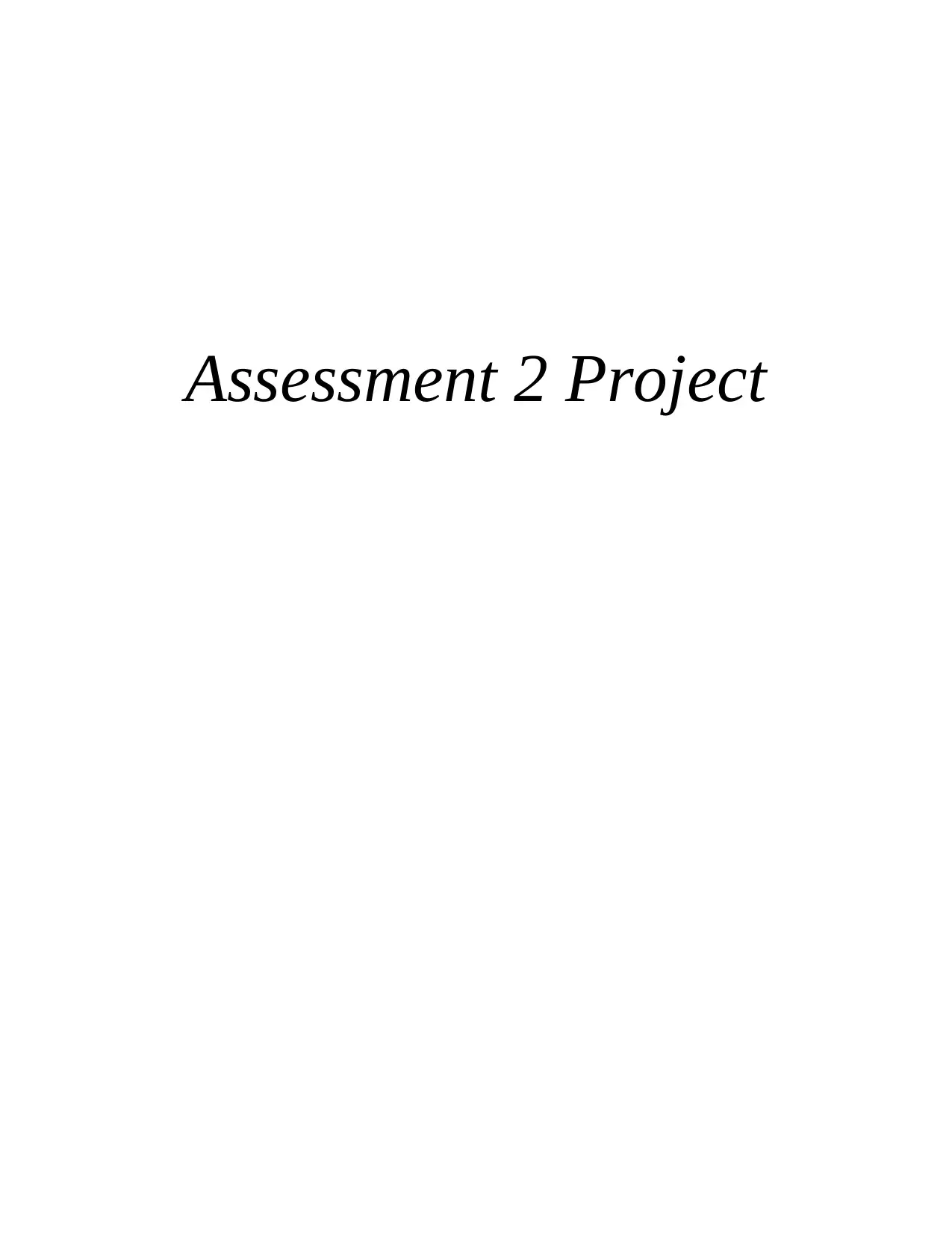
Assessment 2 Project
Paraphrase This Document
Need a fresh take? Get an instant paraphrase of this document with our AI Paraphraser
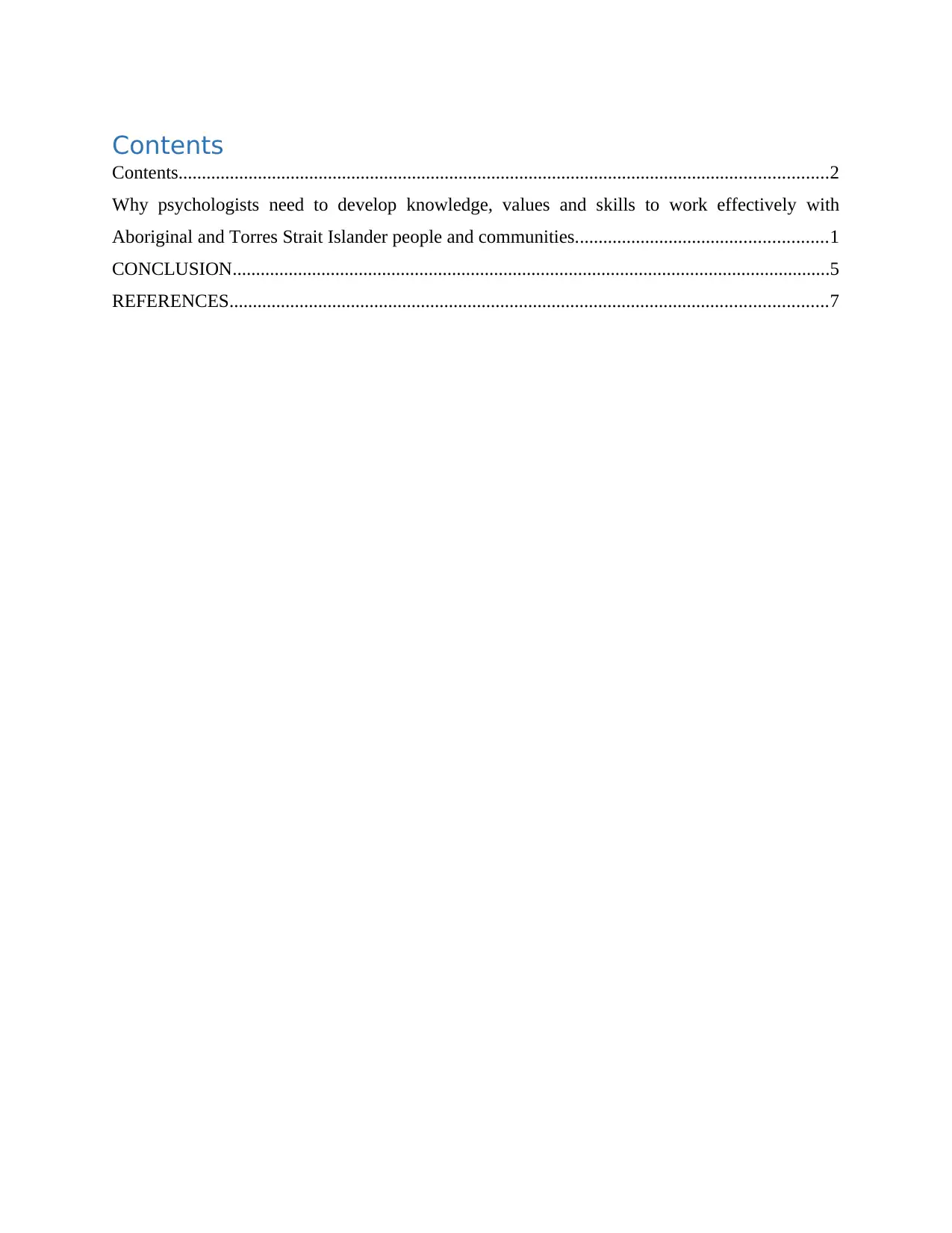
Contents
Contents...........................................................................................................................................2
Why psychologists need to develop knowledge, values and skills to work effectively with
Aboriginal and Torres Strait Islander people and communities......................................................1
CONCLUSION................................................................................................................................5
REFERENCES................................................................................................................................7
Contents...........................................................................................................................................2
Why psychologists need to develop knowledge, values and skills to work effectively with
Aboriginal and Torres Strait Islander people and communities......................................................1
CONCLUSION................................................................................................................................5
REFERENCES................................................................................................................................7
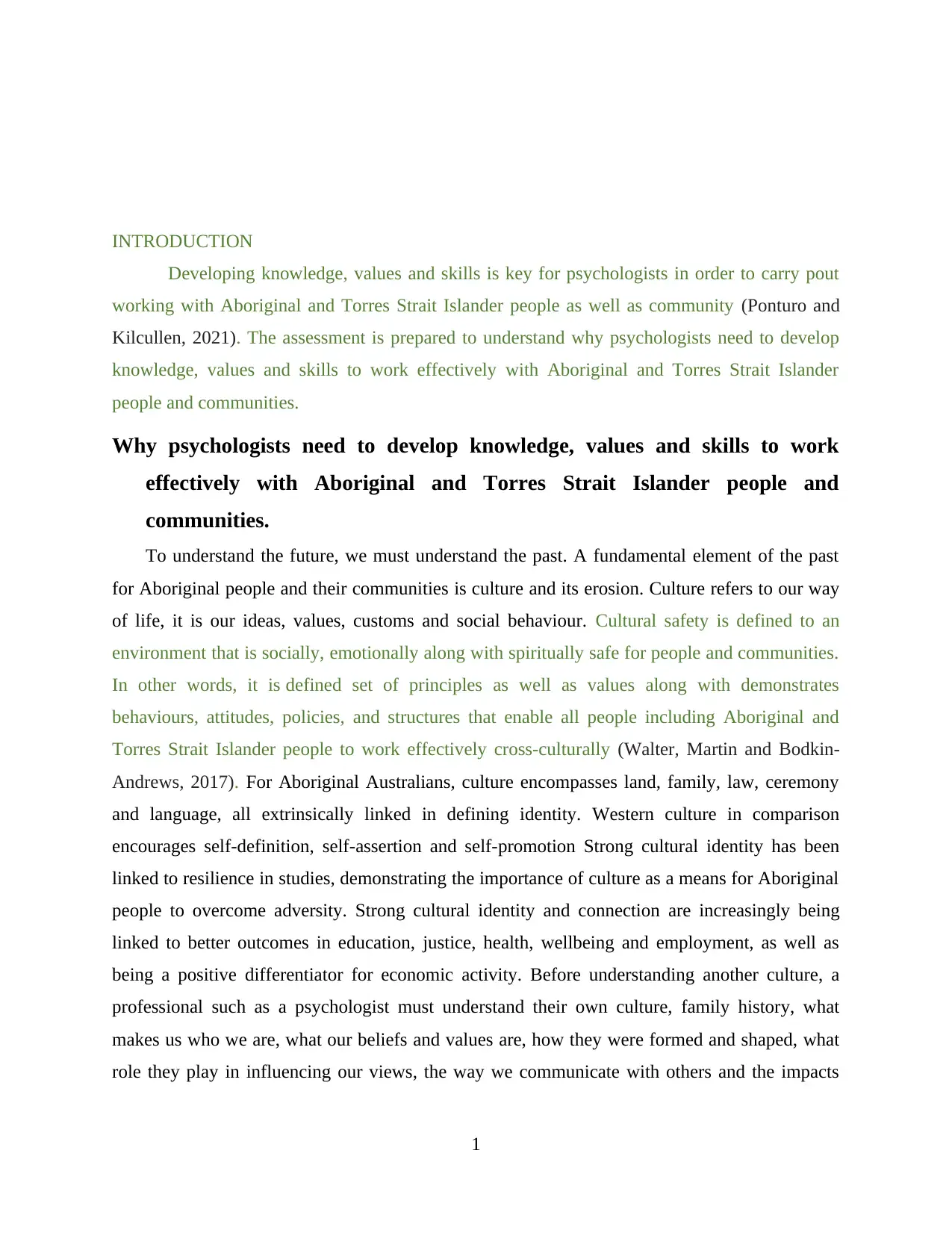
INTRODUCTION
Developing knowledge, values and skills is key for psychologists in order to carry pout
working with Aboriginal and Torres Strait Islander people as well as community (Ponturo and
Kilcullen, 2021). The assessment is prepared to understand why psychologists need to develop
knowledge, values and skills to work effectively with Aboriginal and Torres Strait Islander
people and communities.
Why psychologists need to develop knowledge, values and skills to work
effectively with Aboriginal and Torres Strait Islander people and
communities.
To understand the future, we must understand the past. A fundamental element of the past
for Aboriginal people and their communities is culture and its erosion. Culture refers to our way
of life, it is our ideas, values, customs and social behaviour. Cultural safety is defined to an
environment that is socially, emotionally along with spiritually safe for people and communities.
In other words, it is defined set of principles as well as values along with demonstrates
behaviours, attitudes, policies, and structures that enable all people including Aboriginal and
Torres Strait Islander people to work effectively cross-culturally (Walter, Martin and Bodkin-
Andrews, 2017). For Aboriginal Australians, culture encompasses land, family, law, ceremony
and language, all extrinsically linked in defining identity. Western culture in comparison
encourages self-definition, self-assertion and self-promotion Strong cultural identity has been
linked to resilience in studies, demonstrating the importance of culture as a means for Aboriginal
people to overcome adversity. Strong cultural identity and connection are increasingly being
linked to better outcomes in education, justice, health, wellbeing and employment, as well as
being a positive differentiator for economic activity. Before understanding another culture, a
professional such as a psychologist must understand their own culture, family history, what
makes us who we are, what our beliefs and values are, how they were formed and shaped, what
role they play in influencing our views, the way we communicate with others and the impacts
1
Developing knowledge, values and skills is key for psychologists in order to carry pout
working with Aboriginal and Torres Strait Islander people as well as community (Ponturo and
Kilcullen, 2021). The assessment is prepared to understand why psychologists need to develop
knowledge, values and skills to work effectively with Aboriginal and Torres Strait Islander
people and communities.
Why psychologists need to develop knowledge, values and skills to work
effectively with Aboriginal and Torres Strait Islander people and
communities.
To understand the future, we must understand the past. A fundamental element of the past
for Aboriginal people and their communities is culture and its erosion. Culture refers to our way
of life, it is our ideas, values, customs and social behaviour. Cultural safety is defined to an
environment that is socially, emotionally along with spiritually safe for people and communities.
In other words, it is defined set of principles as well as values along with demonstrates
behaviours, attitudes, policies, and structures that enable all people including Aboriginal and
Torres Strait Islander people to work effectively cross-culturally (Walter, Martin and Bodkin-
Andrews, 2017). For Aboriginal Australians, culture encompasses land, family, law, ceremony
and language, all extrinsically linked in defining identity. Western culture in comparison
encourages self-definition, self-assertion and self-promotion Strong cultural identity has been
linked to resilience in studies, demonstrating the importance of culture as a means for Aboriginal
people to overcome adversity. Strong cultural identity and connection are increasingly being
linked to better outcomes in education, justice, health, wellbeing and employment, as well as
being a positive differentiator for economic activity. Before understanding another culture, a
professional such as a psychologist must understand their own culture, family history, what
makes us who we are, what our beliefs and values are, how they were formed and shaped, what
role they play in influencing our views, the way we communicate with others and the impacts
1
⊘ This is a preview!⊘
Do you want full access?
Subscribe today to unlock all pages.

Trusted by 1+ million students worldwide
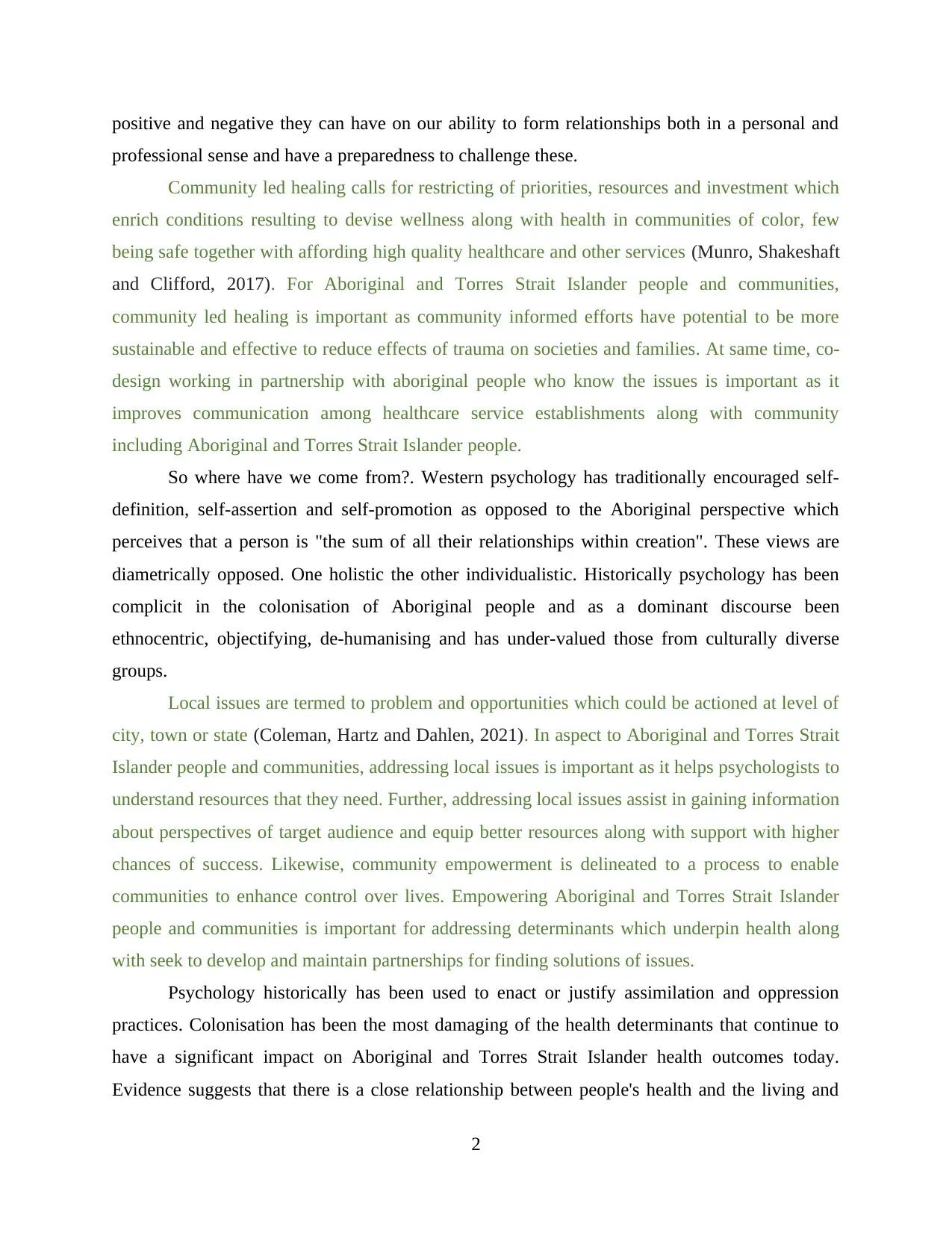
positive and negative they can have on our ability to form relationships both in a personal and
professional sense and have a preparedness to challenge these.
Community led healing calls for restricting of priorities, resources and investment which
enrich conditions resulting to devise wellness along with health in communities of color, few
being safe together with affording high quality healthcare and other services (Munro, Shakeshaft
and Clifford, 2017). For Aboriginal and Torres Strait Islander people and communities,
community led healing is important as community informed efforts have potential to be more
sustainable and effective to reduce effects of trauma on societies and families. At same time, co-
design working in partnership with aboriginal people who know the issues is important as it
improves communication among healthcare service establishments along with community
including Aboriginal and Torres Strait Islander people.
So where have we come from?. Western psychology has traditionally encouraged self-
definition, self-assertion and self-promotion as opposed to the Aboriginal perspective which
perceives that a person is "the sum of all their relationships within creation". These views are
diametrically opposed. One holistic the other individualistic. Historically psychology has been
complicit in the colonisation of Aboriginal people and as a dominant discourse been
ethnocentric, objectifying, de-humanising and has under-valued those from culturally diverse
groups.
Local issues are termed to problem and opportunities which could be actioned at level of
city, town or state (Coleman, Hartz and Dahlen, 2021). In aspect to Aboriginal and Torres Strait
Islander people and communities, addressing local issues is important as it helps psychologists to
understand resources that they need. Further, addressing local issues assist in gaining information
about perspectives of target audience and equip better resources along with support with higher
chances of success. Likewise, community empowerment is delineated to a process to enable
communities to enhance control over lives. Empowering Aboriginal and Torres Strait Islander
people and communities is important for addressing determinants which underpin health along
with seek to develop and maintain partnerships for finding solutions of issues.
Psychology historically has been used to enact or justify assimilation and oppression
practices. Colonisation has been the most damaging of the health determinants that continue to
have a significant impact on Aboriginal and Torres Strait Islander health outcomes today.
Evidence suggests that there is a close relationship between people's health and the living and
2
professional sense and have a preparedness to challenge these.
Community led healing calls for restricting of priorities, resources and investment which
enrich conditions resulting to devise wellness along with health in communities of color, few
being safe together with affording high quality healthcare and other services (Munro, Shakeshaft
and Clifford, 2017). For Aboriginal and Torres Strait Islander people and communities,
community led healing is important as community informed efforts have potential to be more
sustainable and effective to reduce effects of trauma on societies and families. At same time, co-
design working in partnership with aboriginal people who know the issues is important as it
improves communication among healthcare service establishments along with community
including Aboriginal and Torres Strait Islander people.
So where have we come from?. Western psychology has traditionally encouraged self-
definition, self-assertion and self-promotion as opposed to the Aboriginal perspective which
perceives that a person is "the sum of all their relationships within creation". These views are
diametrically opposed. One holistic the other individualistic. Historically psychology has been
complicit in the colonisation of Aboriginal people and as a dominant discourse been
ethnocentric, objectifying, de-humanising and has under-valued those from culturally diverse
groups.
Local issues are termed to problem and opportunities which could be actioned at level of
city, town or state (Coleman, Hartz and Dahlen, 2021). In aspect to Aboriginal and Torres Strait
Islander people and communities, addressing local issues is important as it helps psychologists to
understand resources that they need. Further, addressing local issues assist in gaining information
about perspectives of target audience and equip better resources along with support with higher
chances of success. Likewise, community empowerment is delineated to a process to enable
communities to enhance control over lives. Empowering Aboriginal and Torres Strait Islander
people and communities is important for addressing determinants which underpin health along
with seek to develop and maintain partnerships for finding solutions of issues.
Psychology historically has been used to enact or justify assimilation and oppression
practices. Colonisation has been the most damaging of the health determinants that continue to
have a significant impact on Aboriginal and Torres Strait Islander health outcomes today.
Evidence suggests that there is a close relationship between people's health and the living and
2
Paraphrase This Document
Need a fresh take? Get an instant paraphrase of this document with our AI Paraphraser
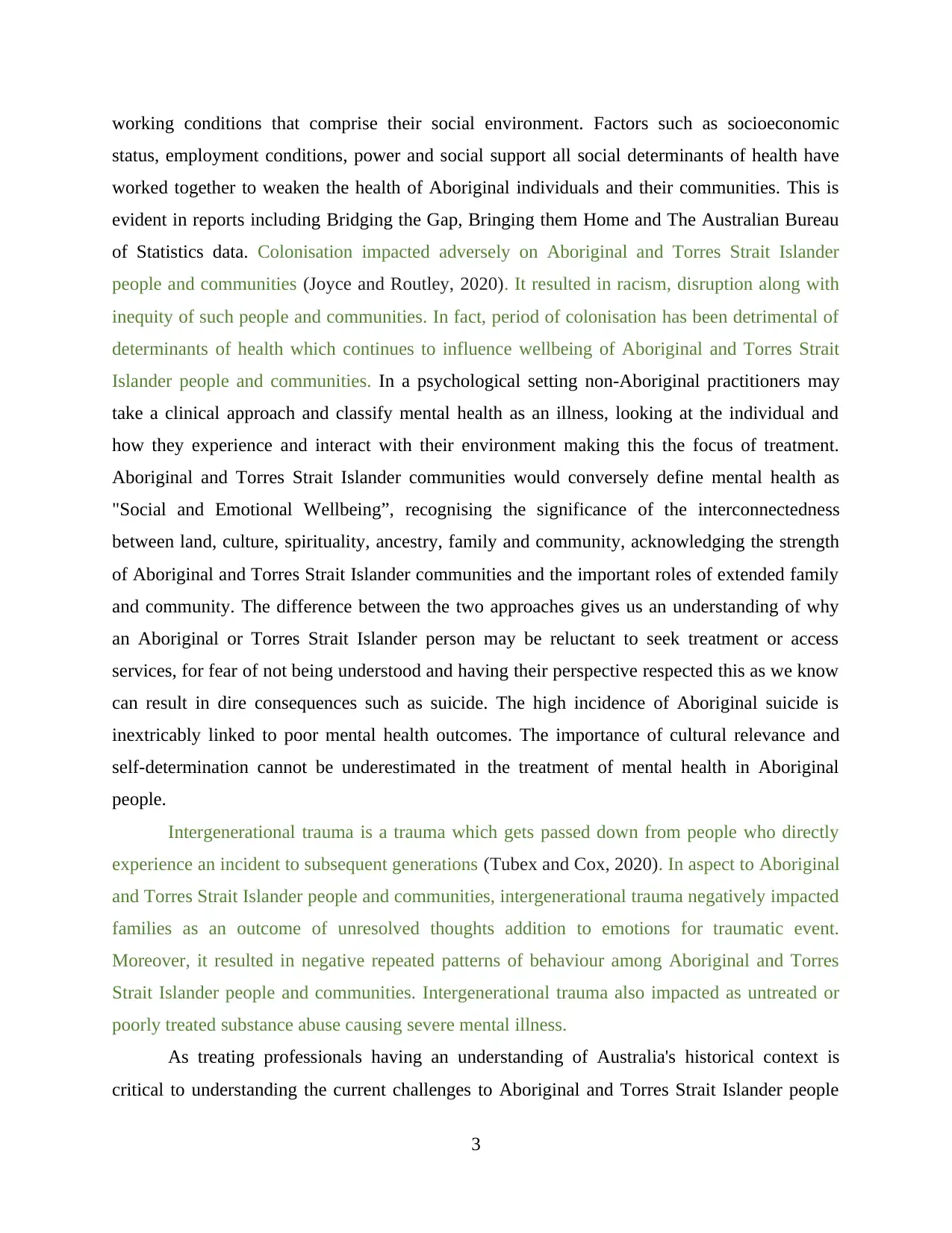
working conditions that comprise their social environment. Factors such as socioeconomic
status, employment conditions, power and social support all social determinants of health have
worked together to weaken the health of Aboriginal individuals and their communities. This is
evident in reports including Bridging the Gap, Bringing them Home and The Australian Bureau
of Statistics data. Colonisation impacted adversely on Aboriginal and Torres Strait Islander
people and communities (Joyce and Routley, 2020). It resulted in racism, disruption along with
inequity of such people and communities. In fact, period of colonisation has been detrimental of
determinants of health which continues to influence wellbeing of Aboriginal and Torres Strait
Islander people and communities. In a psychological setting non-Aboriginal practitioners may
take a clinical approach and classify mental health as an illness, looking at the individual and
how they experience and interact with their environment making this the focus of treatment.
Aboriginal and Torres Strait Islander communities would conversely define mental health as
"Social and Emotional Wellbeing”, recognising the significance of the interconnectedness
between land, culture, spirituality, ancestry, family and community, acknowledging the strength
of Aboriginal and Torres Strait Islander communities and the important roles of extended family
and community. The difference between the two approaches gives us an understanding of why
an Aboriginal or Torres Strait Islander person may be reluctant to seek treatment or access
services, for fear of not being understood and having their perspective respected this as we know
can result in dire consequences such as suicide. The high incidence of Aboriginal suicide is
inextricably linked to poor mental health outcomes. The importance of cultural relevance and
self-determination cannot be underestimated in the treatment of mental health in Aboriginal
people.
Intergenerational trauma is a trauma which gets passed down from people who directly
experience an incident to subsequent generations (Tubex and Cox, 2020). In aspect to Aboriginal
and Torres Strait Islander people and communities, intergenerational trauma negatively impacted
families as an outcome of unresolved thoughts addition to emotions for traumatic event.
Moreover, it resulted in negative repeated patterns of behaviour among Aboriginal and Torres
Strait Islander people and communities. Intergenerational trauma also impacted as untreated or
poorly treated substance abuse causing severe mental illness.
As treating professionals having an understanding of Australia's historical context is
critical to understanding the current challenges to Aboriginal and Torres Strait Islander people
3
status, employment conditions, power and social support all social determinants of health have
worked together to weaken the health of Aboriginal individuals and their communities. This is
evident in reports including Bridging the Gap, Bringing them Home and The Australian Bureau
of Statistics data. Colonisation impacted adversely on Aboriginal and Torres Strait Islander
people and communities (Joyce and Routley, 2020). It resulted in racism, disruption along with
inequity of such people and communities. In fact, period of colonisation has been detrimental of
determinants of health which continues to influence wellbeing of Aboriginal and Torres Strait
Islander people and communities. In a psychological setting non-Aboriginal practitioners may
take a clinical approach and classify mental health as an illness, looking at the individual and
how they experience and interact with their environment making this the focus of treatment.
Aboriginal and Torres Strait Islander communities would conversely define mental health as
"Social and Emotional Wellbeing”, recognising the significance of the interconnectedness
between land, culture, spirituality, ancestry, family and community, acknowledging the strength
of Aboriginal and Torres Strait Islander communities and the important roles of extended family
and community. The difference between the two approaches gives us an understanding of why
an Aboriginal or Torres Strait Islander person may be reluctant to seek treatment or access
services, for fear of not being understood and having their perspective respected this as we know
can result in dire consequences such as suicide. The high incidence of Aboriginal suicide is
inextricably linked to poor mental health outcomes. The importance of cultural relevance and
self-determination cannot be underestimated in the treatment of mental health in Aboriginal
people.
Intergenerational trauma is a trauma which gets passed down from people who directly
experience an incident to subsequent generations (Tubex and Cox, 2020). In aspect to Aboriginal
and Torres Strait Islander people and communities, intergenerational trauma negatively impacted
families as an outcome of unresolved thoughts addition to emotions for traumatic event.
Moreover, it resulted in negative repeated patterns of behaviour among Aboriginal and Torres
Strait Islander people and communities. Intergenerational trauma also impacted as untreated or
poorly treated substance abuse causing severe mental illness.
As treating professionals having an understanding of Australia's historical context is
critical to understanding the current challenges to Aboriginal and Torres Strait Islander people
3
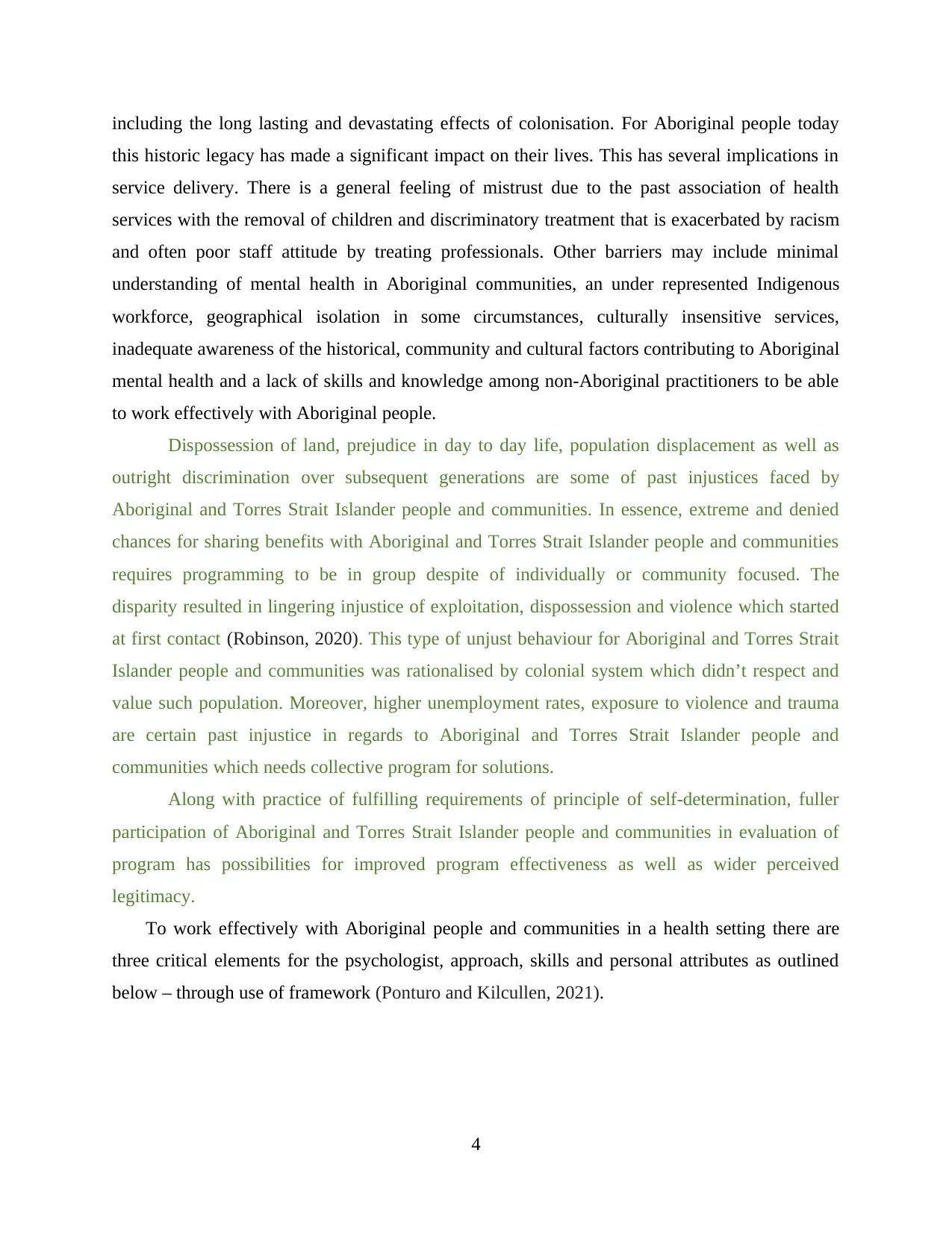
including the long lasting and devastating effects of colonisation. For Aboriginal people today
this historic legacy has made a significant impact on their lives. This has several implications in
service delivery. There is a general feeling of mistrust due to the past association of health
services with the removal of children and discriminatory treatment that is exacerbated by racism
and often poor staff attitude by treating professionals. Other barriers may include minimal
understanding of mental health in Aboriginal communities, an under represented Indigenous
workforce, geographical isolation in some circumstances, culturally insensitive services,
inadequate awareness of the historical, community and cultural factors contributing to Aboriginal
mental health and a lack of skills and knowledge among non-Aboriginal practitioners to be able
to work effectively with Aboriginal people.
Dispossession of land, prejudice in day to day life, population displacement as well as
outright discrimination over subsequent generations are some of past injustices faced by
Aboriginal and Torres Strait Islander people and communities. In essence, extreme and denied
chances for sharing benefits with Aboriginal and Torres Strait Islander people and communities
requires programming to be in group despite of individually or community focused. The
disparity resulted in lingering injustice of exploitation, dispossession and violence which started
at first contact (Robinson, 2020). This type of unjust behaviour for Aboriginal and Torres Strait
Islander people and communities was rationalised by colonial system which didn’t respect and
value such population. Moreover, higher unemployment rates, exposure to violence and trauma
are certain past injustice in regards to Aboriginal and Torres Strait Islander people and
communities which needs collective program for solutions.
Along with practice of fulfilling requirements of principle of self-determination, fuller
participation of Aboriginal and Torres Strait Islander people and communities in evaluation of
program has possibilities for improved program effectiveness as well as wider perceived
legitimacy.
To work effectively with Aboriginal people and communities in a health setting there are
three critical elements for the psychologist, approach, skills and personal attributes as outlined
below – through use of framework (Ponturo and Kilcullen, 2021).
4
this historic legacy has made a significant impact on their lives. This has several implications in
service delivery. There is a general feeling of mistrust due to the past association of health
services with the removal of children and discriminatory treatment that is exacerbated by racism
and often poor staff attitude by treating professionals. Other barriers may include minimal
understanding of mental health in Aboriginal communities, an under represented Indigenous
workforce, geographical isolation in some circumstances, culturally insensitive services,
inadequate awareness of the historical, community and cultural factors contributing to Aboriginal
mental health and a lack of skills and knowledge among non-Aboriginal practitioners to be able
to work effectively with Aboriginal people.
Dispossession of land, prejudice in day to day life, population displacement as well as
outright discrimination over subsequent generations are some of past injustices faced by
Aboriginal and Torres Strait Islander people and communities. In essence, extreme and denied
chances for sharing benefits with Aboriginal and Torres Strait Islander people and communities
requires programming to be in group despite of individually or community focused. The
disparity resulted in lingering injustice of exploitation, dispossession and violence which started
at first contact (Robinson, 2020). This type of unjust behaviour for Aboriginal and Torres Strait
Islander people and communities was rationalised by colonial system which didn’t respect and
value such population. Moreover, higher unemployment rates, exposure to violence and trauma
are certain past injustice in regards to Aboriginal and Torres Strait Islander people and
communities which needs collective program for solutions.
Along with practice of fulfilling requirements of principle of self-determination, fuller
participation of Aboriginal and Torres Strait Islander people and communities in evaluation of
program has possibilities for improved program effectiveness as well as wider perceived
legitimacy.
To work effectively with Aboriginal people and communities in a health setting there are
three critical elements for the psychologist, approach, skills and personal attributes as outlined
below – through use of framework (Ponturo and Kilcullen, 2021).
4
⊘ This is a preview!⊘
Do you want full access?
Subscribe today to unlock all pages.

Trusted by 1+ million students worldwide
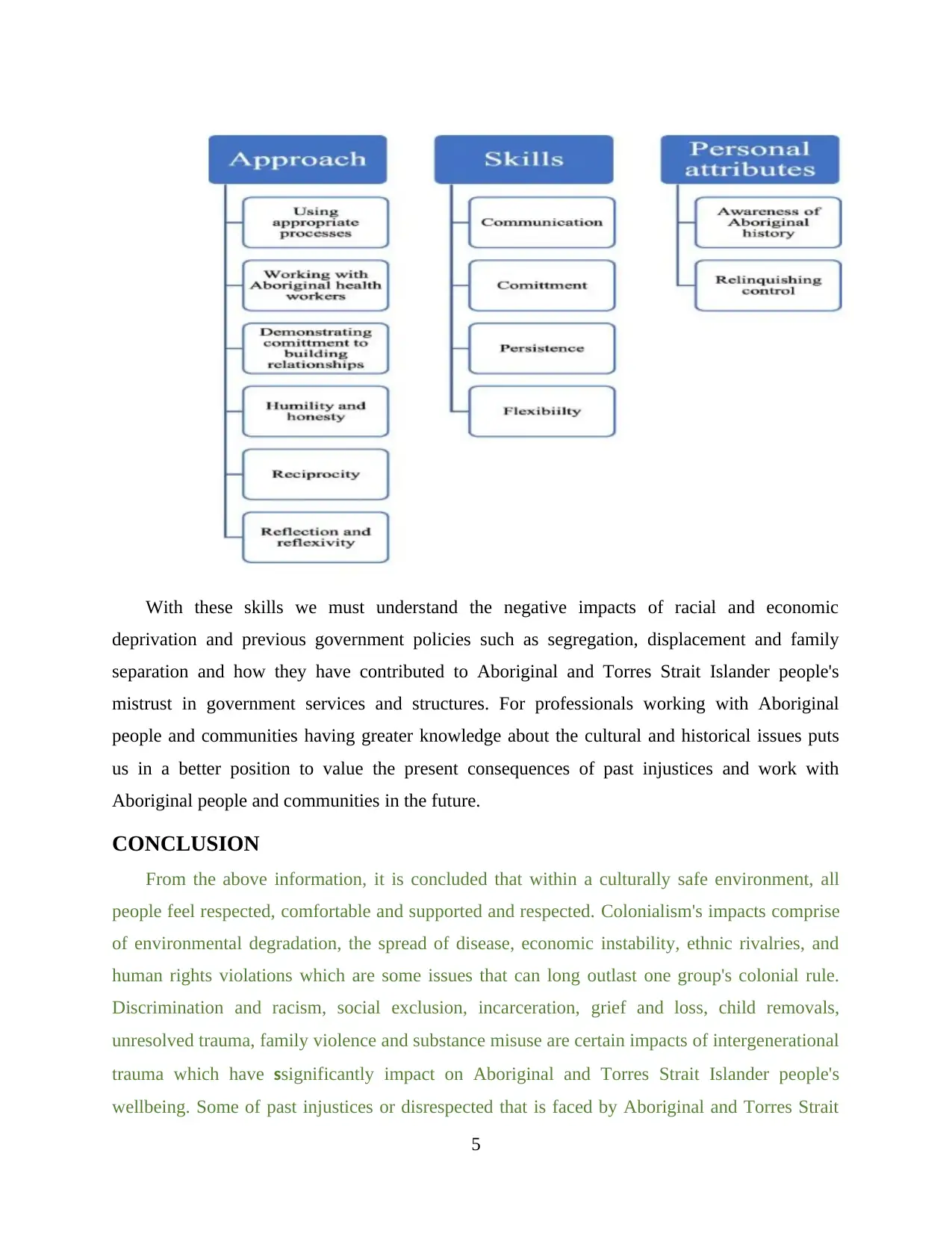
With these skills we must understand the negative impacts of racial and economic
deprivation and previous government policies such as segregation, displacement and family
separation and how they have contributed to Aboriginal and Torres Strait Islander people's
mistrust in government services and structures. For professionals working with Aboriginal
people and communities having greater knowledge about the cultural and historical issues puts
us in a better position to value the present consequences of past injustices and work with
Aboriginal people and communities in the future.
CONCLUSION
From the above information, it is concluded that within a culturally safe environment, all
people feel respected, comfortable and supported and respected. Colonialism's impacts comprise
of environmental degradation, the spread of disease, economic instability, ethnic rivalries, and
human rights violations which are some issues that can long outlast one group's colonial rule.
Discrimination and racism, social exclusion, incarceration, grief and loss, child removals,
unresolved trauma, family violence and substance misuse are certain impacts of intergenerational
trauma which have ssignificantly impact on Aboriginal and Torres Strait Islander people's
wellbeing. Some of past injustices or disrespected that is faced by Aboriginal and Torres Strait
5
deprivation and previous government policies such as segregation, displacement and family
separation and how they have contributed to Aboriginal and Torres Strait Islander people's
mistrust in government services and structures. For professionals working with Aboriginal
people and communities having greater knowledge about the cultural and historical issues puts
us in a better position to value the present consequences of past injustices and work with
Aboriginal people and communities in the future.
CONCLUSION
From the above information, it is concluded that within a culturally safe environment, all
people feel respected, comfortable and supported and respected. Colonialism's impacts comprise
of environmental degradation, the spread of disease, economic instability, ethnic rivalries, and
human rights violations which are some issues that can long outlast one group's colonial rule.
Discrimination and racism, social exclusion, incarceration, grief and loss, child removals,
unresolved trauma, family violence and substance misuse are certain impacts of intergenerational
trauma which have ssignificantly impact on Aboriginal and Torres Strait Islander people's
wellbeing. Some of past injustices or disrespected that is faced by Aboriginal and Torres Strait
5
Paraphrase This Document
Need a fresh take? Get an instant paraphrase of this document with our AI Paraphraser
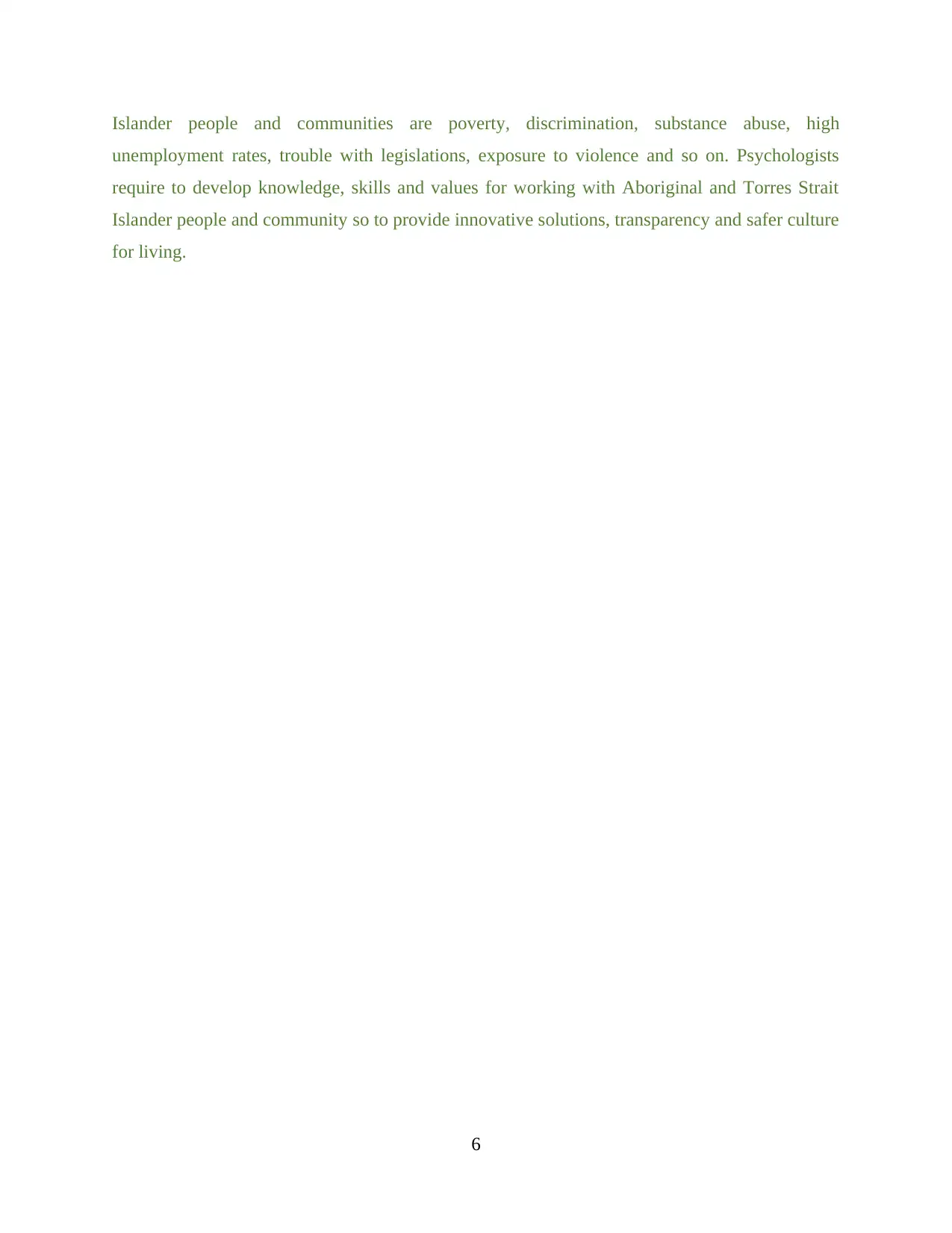
Islander people and communities are poverty, discrimination, substance abuse, high
unemployment rates, trouble with legislations, exposure to violence and so on. Psychologists
require to develop knowledge, skills and values for working with Aboriginal and Torres Strait
Islander people and community so to provide innovative solutions, transparency and safer culture
for living.
6
unemployment rates, trouble with legislations, exposure to violence and so on. Psychologists
require to develop knowledge, skills and values for working with Aboriginal and Torres Strait
Islander people and community so to provide innovative solutions, transparency and safer culture
for living.
6
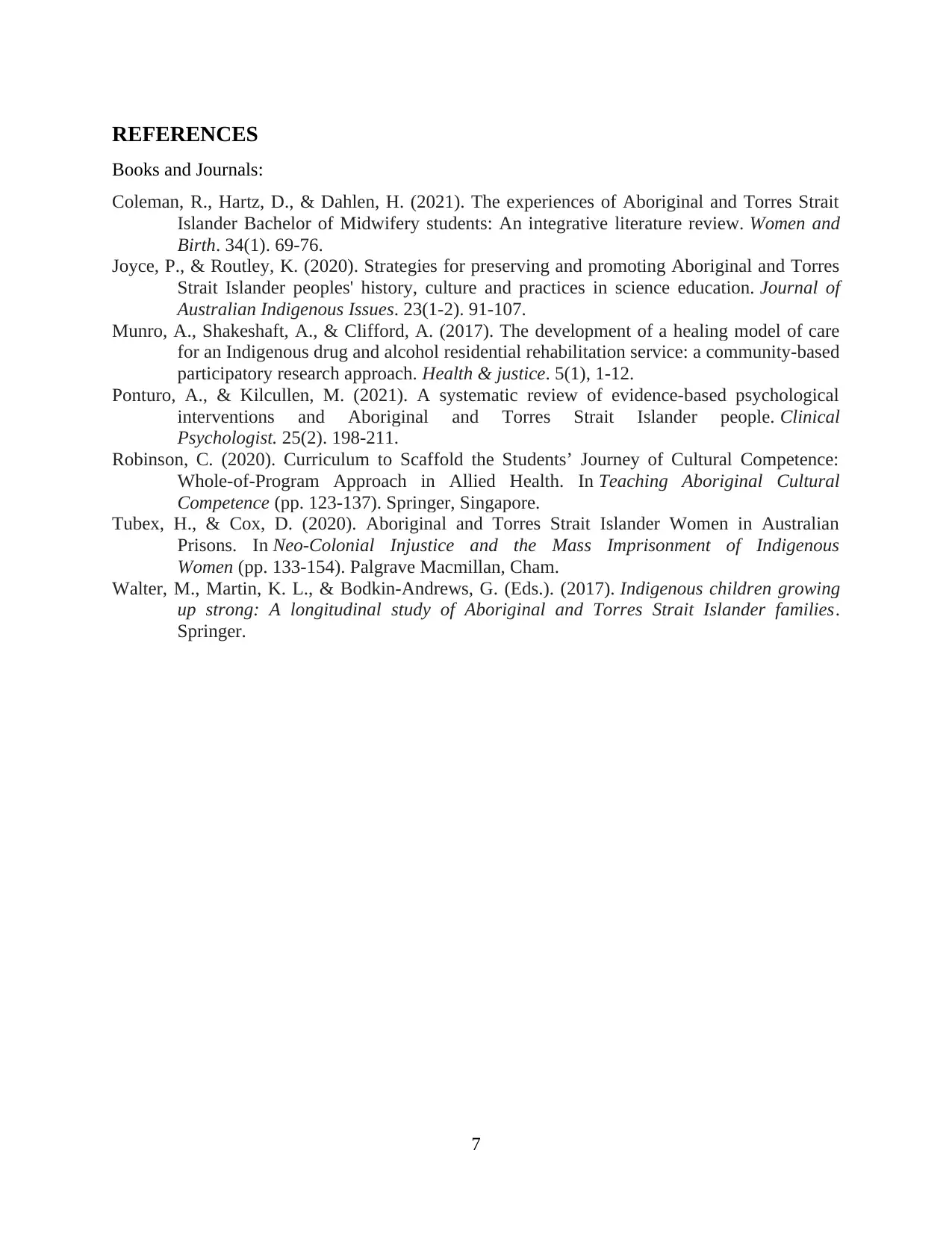
REFERENCES
Books and Journals:
Coleman, R., Hartz, D., & Dahlen, H. (2021). The experiences of Aboriginal and Torres Strait
Islander Bachelor of Midwifery students: An integrative literature review. Women and
Birth. 34(1). 69-76.
Joyce, P., & Routley, K. (2020). Strategies for preserving and promoting Aboriginal and Torres
Strait Islander peoples' history, culture and practices in science education. Journal of
Australian Indigenous Issues. 23(1-2). 91-107.
Munro, A., Shakeshaft, A., & Clifford, A. (2017). The development of a healing model of care
for an Indigenous drug and alcohol residential rehabilitation service: a community-based
participatory research approach. Health & justice. 5(1), 1-12.
Ponturo, A., & Kilcullen, M. (2021). A systematic review of evidence-based psychological
interventions and Aboriginal and Torres Strait Islander people. Clinical
Psychologist. 25(2). 198-211.
Robinson, C. (2020). Curriculum to Scaffold the Students’ Journey of Cultural Competence:
Whole-of-Program Approach in Allied Health. In Teaching Aboriginal Cultural
Competence (pp. 123-137). Springer, Singapore.
Tubex, H., & Cox, D. (2020). Aboriginal and Torres Strait Islander Women in Australian
Prisons. In Neo-Colonial Injustice and the Mass Imprisonment of Indigenous
Women (pp. 133-154). Palgrave Macmillan, Cham.
Walter, M., Martin, K. L., & Bodkin-Andrews, G. (Eds.). (2017). Indigenous children growing
up strong: A longitudinal study of Aboriginal and Torres Strait Islander families.
Springer.
7
Books and Journals:
Coleman, R., Hartz, D., & Dahlen, H. (2021). The experiences of Aboriginal and Torres Strait
Islander Bachelor of Midwifery students: An integrative literature review. Women and
Birth. 34(1). 69-76.
Joyce, P., & Routley, K. (2020). Strategies for preserving and promoting Aboriginal and Torres
Strait Islander peoples' history, culture and practices in science education. Journal of
Australian Indigenous Issues. 23(1-2). 91-107.
Munro, A., Shakeshaft, A., & Clifford, A. (2017). The development of a healing model of care
for an Indigenous drug and alcohol residential rehabilitation service: a community-based
participatory research approach. Health & justice. 5(1), 1-12.
Ponturo, A., & Kilcullen, M. (2021). A systematic review of evidence-based psychological
interventions and Aboriginal and Torres Strait Islander people. Clinical
Psychologist. 25(2). 198-211.
Robinson, C. (2020). Curriculum to Scaffold the Students’ Journey of Cultural Competence:
Whole-of-Program Approach in Allied Health. In Teaching Aboriginal Cultural
Competence (pp. 123-137). Springer, Singapore.
Tubex, H., & Cox, D. (2020). Aboriginal and Torres Strait Islander Women in Australian
Prisons. In Neo-Colonial Injustice and the Mass Imprisonment of Indigenous
Women (pp. 133-154). Palgrave Macmillan, Cham.
Walter, M., Martin, K. L., & Bodkin-Andrews, G. (Eds.). (2017). Indigenous children growing
up strong: A longitudinal study of Aboriginal and Torres Strait Islander families.
Springer.
7
⊘ This is a preview!⊘
Do you want full access?
Subscribe today to unlock all pages.

Trusted by 1+ million students worldwide
1 out of 9
Related Documents
Your All-in-One AI-Powered Toolkit for Academic Success.
+13062052269
info@desklib.com
Available 24*7 on WhatsApp / Email
![[object Object]](/_next/static/media/star-bottom.7253800d.svg)
Unlock your academic potential
Copyright © 2020–2026 A2Z Services. All Rights Reserved. Developed and managed by ZUCOL.





